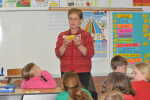Students learn to live healthier

Through a Kansas State Research and Extension program, groups of students in Bourbon County are learning how to live healthier lifestyles.
"You need about five ounces of meat and beans everyday," K-State Research and Extension agent Ann Ludlum told a group of Winfield Scott Elementary School fourth grade students Friday during a nutrition lesson.
Ludlum and K-State Research and Extension Nutrition Assistant Sandy Winters explained to the students the importance of maintaining a proper level of protein in their diets. In order to help the students understand what foods would help them consume the right amount of protein, Ludlum displayed play food such as meats, beans and an egg and allowed the students to give examples of other foods they thought had protein in them.
According to Ludlum, throughout the school year, the extension office conducts monthly classroom nutrition lessons for preschoolers, in addition to students in second and fourth grades at Winfield Scott and second and fifth grades at both Eugene Ware Elementary School and West Bourbon Elementary School. Nutrition lessons are also offered to some senior living groups and are conducted at the monthly commodity distribution site, Ludlum said.
According to information provided by Ludlum, the program is designed to help children make healthier food choices.
"Nutrition education follows the 2005 Guidelines for Americans and MyPyramid," the information said. "The goal of the program is to help people make healthy food choices by choosing nutritious food, including more fruits and vegetables. Participants are also encouraged to balance the food they eat with physical activity."
Not only do the students learn about the importance of following the food groups recommendations, but they also learn about fast food selections, food size portions and other health and wellness techniques, Ludlum said.
"In addition to learning about the food groups, students have learned about the importance of breakfast; choosing healthier fast food; portion sizes; the digestive tract; safe food handling; and the importance of hand washing," Ludlum said. "The final session in May will be Food and Field Olympics, stressing the importance of physical activity as part of a healthy lifestyle."
After learning about health and nutrition through the program, 78 percent of adults and teenagers said they intend to increase their physical activity each week, and 62 percent said they will begin eating meals comprised of a variety of foods from the food guide pyramid, Ludlum's information said.
Funded through the Family Nutrition Program, which is implemented by the extension office and sponsored by the Department of Social and Rehabilitation Services and the United States Department of Agriculture, the program is conducted in about 80 Kansas counties, the information provided by Ludlum said.
